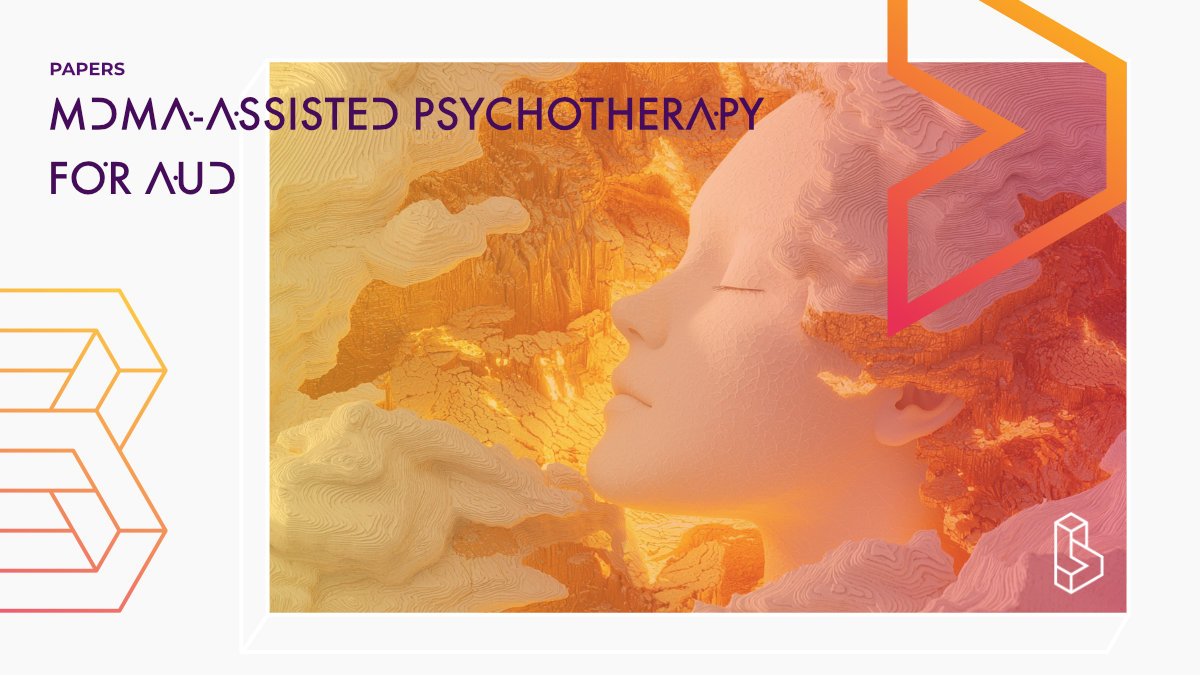This secondary analysis of an open-label feasibility study (n=14) of MDMA-assisted psychotherapy for alcohol use disorder (AUD) found, through Bayesian analysis, a 55-63% probability of achieving a 2-level reduction in WHO drinking risk at 3 months follow-up, with preliminary evidence suggesting reductions in alcohol craving and improvements in sleep and psychosocial functioning compared to baseline.
Abstract of MDMA-assisted psychotherapy for AUD: Bayesian analysis of WHO drinking risk level and exploratory analysis of drinking behavior and psychosocial functioning at 3 months follow-up
Aims: Safety and tolerability data from the first open-label feasibility study of 3,4-methylenedioxymethamphetamine (MDMA)-assisted psychotherapy for alcohol use disorder was recently published. This paper presents a Bayesian analysis of the impact of MDMA-assisted psychotherapy on treatment success, defined as 2-level reduction in the World Health Organization (WHO) drinking risk at the 3 months follow-up. We also examined the impact on drinking behavior and psychosocial measures at 3 months compared to baseline.
Methods: Fourteen participants with a diagnosis of alcohol use disorder who had recently undergone detoxification completed an eight-week course of ten psychotherapy sessions, including two sessions with MDMA. Measures assessing drinking behavior, quality of life, sleep, self-compassion, and empathy were collected. Bayesian analysis using flat and skeptical priors was performed to determine treatment success defined as a 2-level reduction in WHO drinking risk.
Results: Bayesian analysis suggested that the probability of a 2-level reduction in WHO drinking risk from baseline to 3 months post-treatment is 55%–63%, based upon either a flat or skeptical prior respectively. We present preliminary findings suggesting reductions in alcohol craving (measured by the Penn Alcohol Craving Scale and Obsessive Compulsive Drinking Scale) and improvements in sleep and aspects of psychosocial functioning at 3 months follow-up compared to baseline.
Conclusions: The Bayesian analysis provides a useful harm reduction endpoint interpretation of drinking in terms of a 2-level reduction in WHO drinking risk. Further findings provide preliminary insights into the potential impact of MDMA-assisted psychotherapy on quality of life and well-being in addition to reductions in drinking.
Authors: Hannah Thurgur, Ben Sessa, Laurie Higbed, Steve O’Brien, Claire Durant, Sue Wilson, Balázs Szigeti, Celia J. A. Morgan & David J. Nutt
Summary of MDMA-assisted psychotherapy for AUD: Bayesian analysis of WHO drinking risk level and exploratory analysis of drinking behavior and psychosocial functioning at 3 months follow-up
MDMA-assisted psychotherapy has re-emerged as a promising treatment modality, initially investigated in the 1980s and more recently advanced through Phase III clinical trials focused on post-traumatic stress disorder (PTSD). These studies, led by the Multidisciplinary Association for Psychedelic Studies (MAPS), demonstrated substantial efficacy in reducing PTSD symptoms, suggesting that MDMA-assisted therapy may also be effective for other trauma-related conditions such as alcohol use disorder (AUD).
AUD frequently co-occurs with PTSD and other psychiatric conditions, and previous studies have indicated that improvements in PTSD symptoms through MDMA-assisted therapy can also lead to reductions in alcohol consumption. A prior open-label feasibility study on MDMA-assisted psychotherapy for AUD showed promising safety and tolerability outcomes, as well as reductions in drinking. However, it lacked detailed analysis of harm reduction endpoints and the role of alcohol craving.
This paper builds on that foundational work by offering a Bayesian statistical analysis of treatment success, defined as a two-level reduction in the World Health Organization (WHO) drinking risk level at three months. It also explores changes in alcohol craving, sleep, quality of life (QOL), self-compassion, and empathy—factors that contribute to sustained recovery from AUD.
Materials and Methods
Approvals and Drug Source
Find this paper
https://doi.org/10.1093/alcalc/agaf031
Open Access | Google Scholar | Backup | 🕊
Cite this paper (APA)
Thurgur, H., Sessa, B., Higbed, L., O’Brien, S., Durant, C., Wilson, S., ... & Nutt, D. J. (2025). MDMA-assisted psychotherapy for AUD: Bayesian analysis of WHO drinking risk level and exploratory analysis of drinking behavior and psychosocial functioning at 3 months follow-up. Alcohol and Alcoholism, 60(4), agaf031.
Study details
Compounds studied
MDMA
Topics studied
Alcohol Use Disorder
Addiction
Safety
Study characteristics
Original Re-analysis
Open-Label
Participants
14
Humans
Compound Details
The psychedelics given at which dose and how many times
MDMA 125 - 187.5mg | 2x
Linked Research Papers
Notable research papers that build on or are influenced by this paper
First study of safety and tolerability of 3,4-methylenedioxymethamphetamine-assisted psychotherapy in patients with alcohol use disorderThis open-label study (n=14) with MDMA-assisted psychotherapy (2 sessions;187.5mg) found it well-tolerated and safe to use. The average consumption of alcohol nine months later was 18.7 units, versus 130.6 units before the detox (start of the study).
Linked Clinical Trial
Bristol Imperial MDMA in Alcoholism StudyThis open-label study (n=14) investigated the effect of MDMA-assisted psychotherapy in treating patients with alcoholism (Alcohol Use Disorder, AUD). The patients were first detoxified and subsequently underwent eight weeks of therapy, including two high doses of MDMA (125mg + 62.5mg booster) plus therapy.

